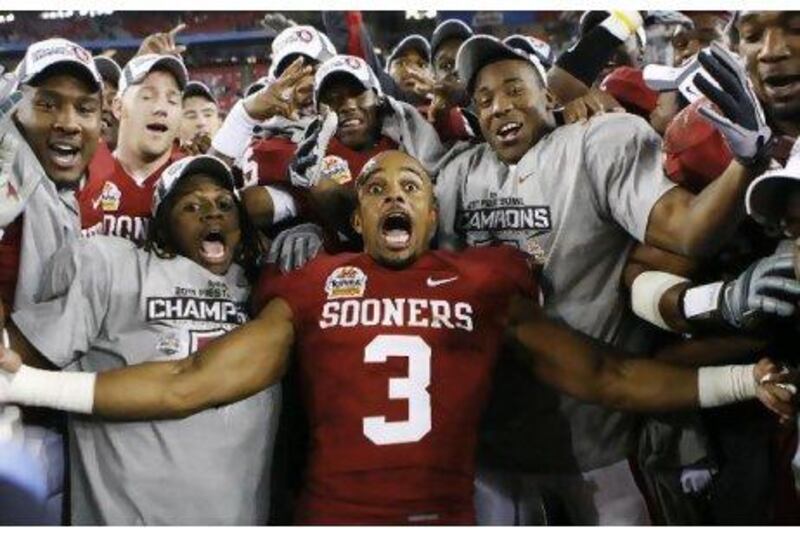In the United States there hums an occasional public debate about American "exceptionalism," and this debate manages to be both bizarre and recurring.
Somebody from the political right wing - say, a rising-star senator - will extol the United States as the greatest country ever. Somebody from the political left wing will dub that right-wing person a doofus and say the United States might not be the greatest country ever.
Somebody from the right wing or from really most any wing, unable to sustain proper respiration if the United States is not the greatest country ever, will pillory the doubter as a meanie and say with consummate self-assurance that the United States is the exceptional greatest-country-ever.
While you would struggle to locate a more spectacular waste of time even if you rummaged every nook of the planet, in one area of life the United States does rate not superior but surely exceptional.
That would be sport, and that would be most pronounced in the month of January, and January would serve as a crescendo for the runaway national game of American football that almost no other country plays.
In nascent 2011, much of Earth concerns itself with which of the front-running Manchesters, or Real Madrid's gaudy grind up Mount Barcelona - note: Kaka returns - or Beckham-to-Tottenham, or Inter Milan's managerial change, or What's The Matter With Chelsea. In the Gulf, the newborn golf and tennis seasons will grace Abu Dhabi and Dubai, and the Asian Cup revs up in Qatar. In Australia, cricket's durable Ashes rumpus persists.
Here in New York, people cheerily know nada of any of those things, and an otherworldliness comes crashing at you straightaway in the JFK Airport passport line. Big television screens show groggy travellers ongoing games of men in American-football armour. If you spent previous months seeing scant American football and watching people play in skimpy clothing - football shorts, golf shirts - this gladiator gear can look like robots. The flight was long, but interplanetary?
As with any culture, the exceptionalness registers heavily after long exit, and here it comes in strands both professional and collegiate.
The latter feels normal when in its midst, yet statistically is one of the most eccentric habits in all humanity.
For the uninitiated, a quick primer: American universities oppose each other at games. Enormous crowds - sometimes more than 100,000 - attend. Many spectators attended one of the competing universities.
Many did not. Many view a huge chunk of self-identity through how the university performs at American football.
Come January, these university teams play the prominent back half of 35 "bowl games", for which schools receive money wrung from advertising wrung from television viewerships of humans slumped intractably into sofas.
Teams with vivid nicknames such as "Horned Frogs", "Badgers", "Nittany Lions", "Gators", "Wolverines", "Sooners", "Hokies", "The Cardinal" and, most puckishly, "Ducks", among so many others, play in games named for flowers or foods or reptiles or crops or websites or mock-Australian steakhouses or artery-clogging fast-food joints or, of course, banks: "Cotton Bowl", "GoDaddy.com Bowl", "Gator Bowl", "Capital One Bowl", "Sugar Bowl", "Outback Bowl", "Chick-fil-A Bowl", "Poinsettia Bowl" and, most revered, "Rose Bowl".
It's a cavalcade of socially accepted strangeness grafted strangely on to a great university system, and it is wonderful and horrible and riveting and dispiriting and healthy and corrupt all at once.
Less aberrant, but equally unusual for this planet, is the NFL, which just finished whittling its season to 12 teams set for three weekends of January gravitas leading to the unapologetically gaudy Super Bowl in early February.
Some people with medical degrees deem the sport unhealthy for the human body. Hardly anyone cares. It grips one country. Most others shrug.
It leads to early February and the unapologetically gaudy Super Bowl, an event that somewhere in there includes a game whose PR materials annually note the list of television rights-holders in voluminous foreign countries.
Some people around the world do watch, and some Americans do overestimate how many people around the world do care. Some watch by intent. Some watch by remote-control serendipity.
Some watch by accident, as with two young Irish men in Barcelona in February 2008, when the New York Giants won a big goose bump of a game against the New England Patriots.
As the Giants, trailing by four in waning seconds, navigated the field, one of the men approached me and asked an elemental question.
"We've been wondering," he said. "If the clock runs out but they still have some of those downs left, do they get to finish the downs?" Thereby did the world stop off to try to grasp the vagaries of the exceptionally weird.





